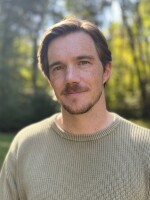Note: this segment is a rebroadcast from June 1, 2017.
Patricia Lockwood grew up in a Catholic family in the Midwest. But her family’s circumstances were a little different: Lockwood’s father was a priest. Throughout her upbringing, Lockwood navigated her father’s larger-than-life personality and the institutional bindings of the Catholic church.
INTERVIEW HIGHLIGHTS
On her dad’s journey to becoming a priest: He started out as a rock 'n' roll atheist, then he joined the Navy and had a conversion experience on a nuclear submarine 100 miles below the surface of the sea. He gets back on land and tells my mother he is a Christian now, and he is going to become a Lutheran minister. He does that, and after a while he says, “That’s not extreme enough. I am going to become a Catholic.” There is this special loophole where a married minister of another faith converts to Catholicism. You can apply for dispensation to become a married Catholic priest, and that’s what he did.
On her family’s experience taking a “psychopath test” when her father became a priest: It was a personality inventory. They administered it to my dad, and he torpedoed it on the first try because he got angry at it. So he tried to fail it on purpose and be known as a psychopath, and then he had to take it again another time. My mom refused to take it because they asked too many questions with double negatives. Then they gave it to the kids too,and we thankfully, or not thankfully, don’t remember it.
On her father’s “larger than life personality” and the time he took the family on a hunting trip: My dad does get these manias. He will get very excited about something. He decided for a period in my childhood to get really excited about guns and hunting. It’s not something that he was particularly good at it. My dad isn’t a guy who wants to kill an animal. He basically got this gun collection going, took us to the shooting range all the time, and took us on a trip to a motel that looked like where Smokey the Bear went to cheat on his wife. We’re just hanging out there, and he’s got my brother up in a tree stand and my sister in a tree stand strapped there with a belt for three hours. And they come back when the hunting trip is over. There is no deer, nothing has been murdered, but my dad steps forward with his arm around my brother’s shoulder, and he says, “Well, you know, your brother got so excited out there that he went ahead and crapped his pants.” So literally the only souvenir we had of the trip was my brother’s pants crapping. So he builds things up to a very great degree but then things get punctured at a certain point.
On sexual abuse scandals in the Catholic church that Lockwood heard about growing up: The way the scandals were in the public eye didn't break until I was out of the house. But it was true that growing up in my house you were always hearing things about certain priests. There was this sort of information that was atmospheric...You knew stuff about these guys, or there were suspicions about these people, or certain men had been sent away for therapy, which is what the church did back in the ‘80s and ‘90s. It’s hard to know whether we knew more than other people or whether our network stretched so far across the United States that we heard more of these anecdotes around the dinner table. It was almost like shop talk in my house.
On her dad’s response to the scandals : My dad was in an interesting position because he was married. So he was trusted more by parishes. I think we tended to go to places where there had been scandals in the churches, but I always felt growing up that he very much stood on the side of good as far as that went. I knew that he stood up to particular bishops about it and that he left certain diocese because he felt they weren’t doing enough about it. So it was never something where I held him culpable, but it’s also true that if you are within the institution then you are a part of it. Part of the genius of institutions is that it spreads blame so thinly across a great area that you don’t know whose fault it is.
SaveSave








